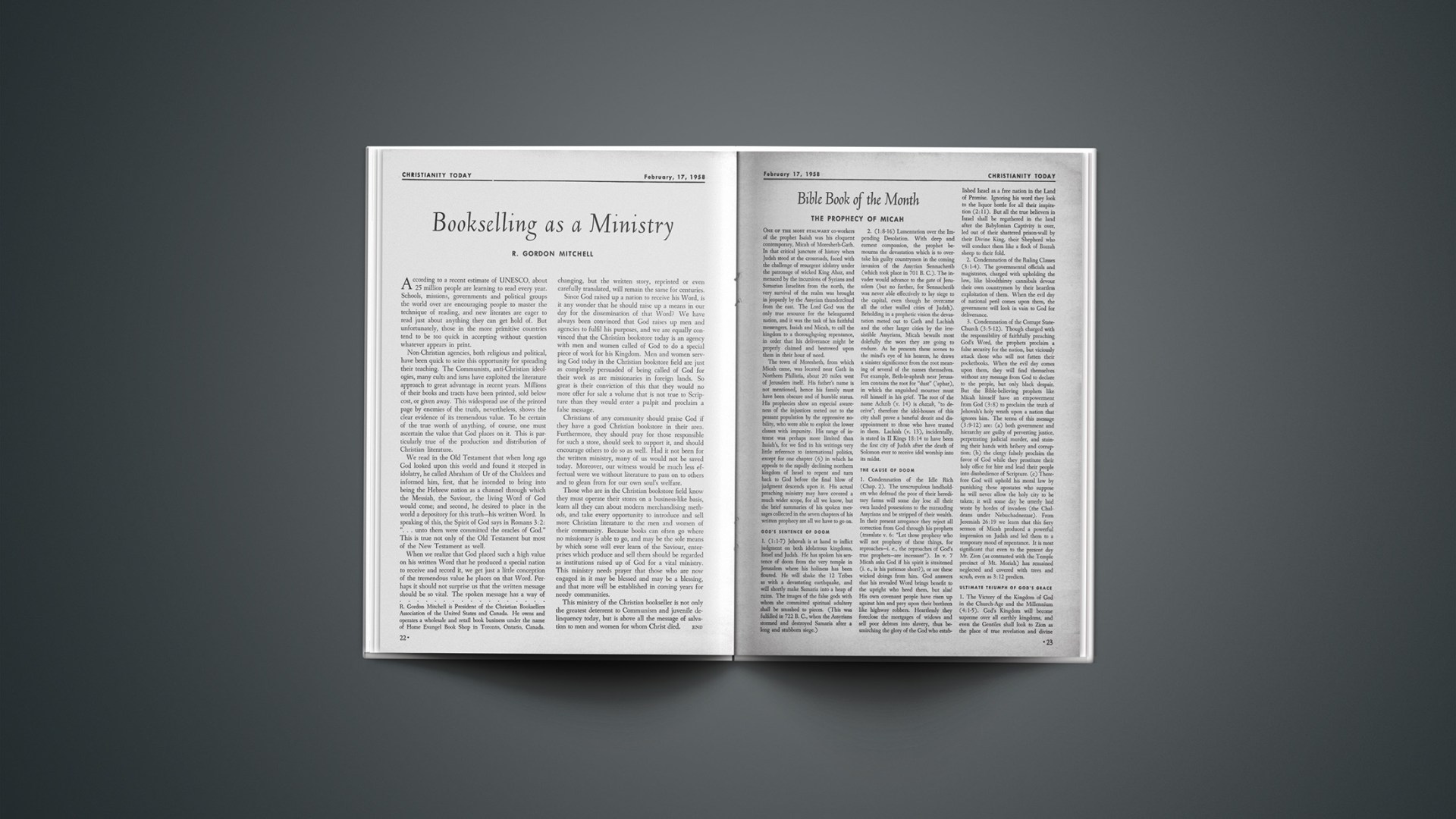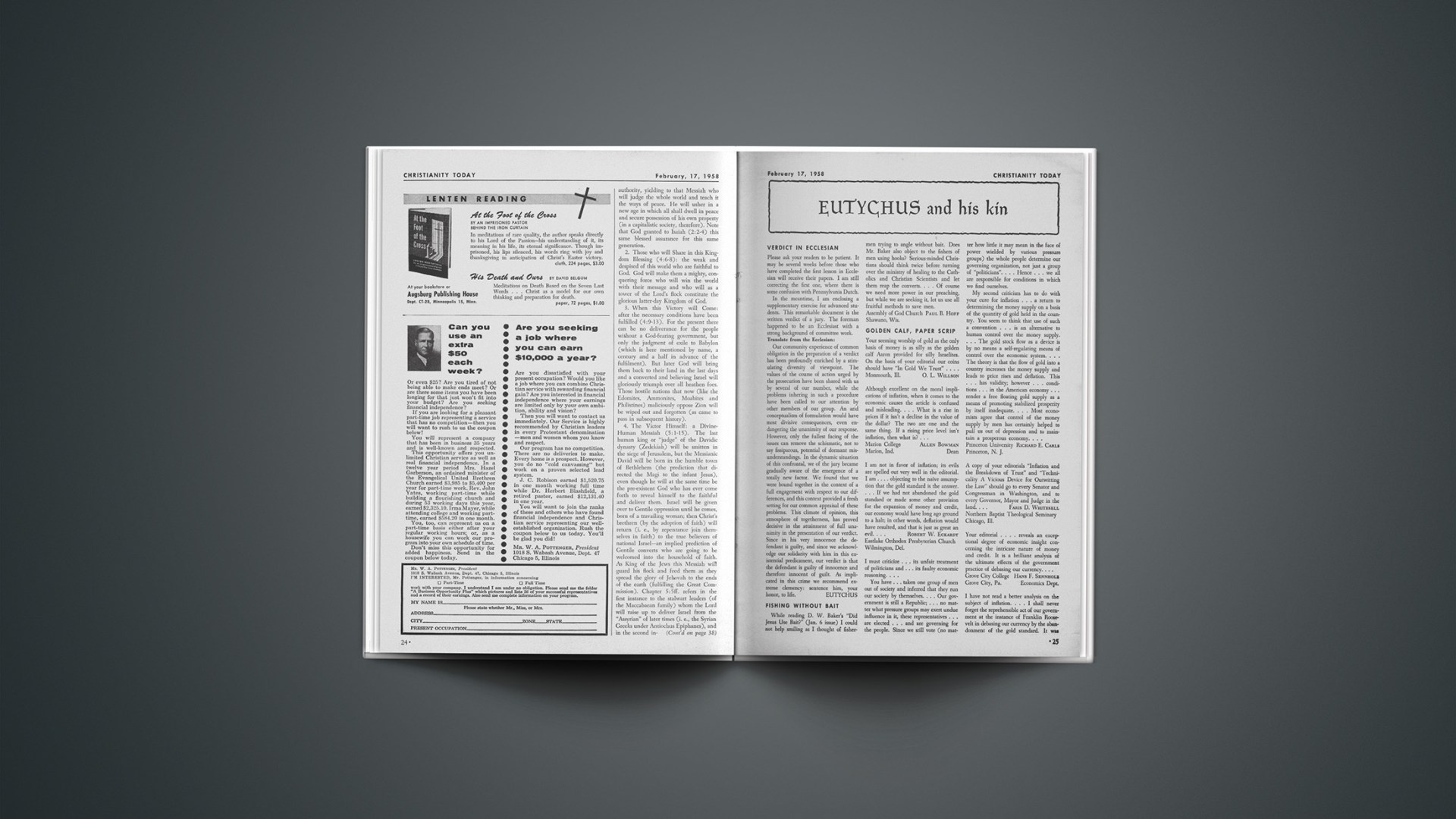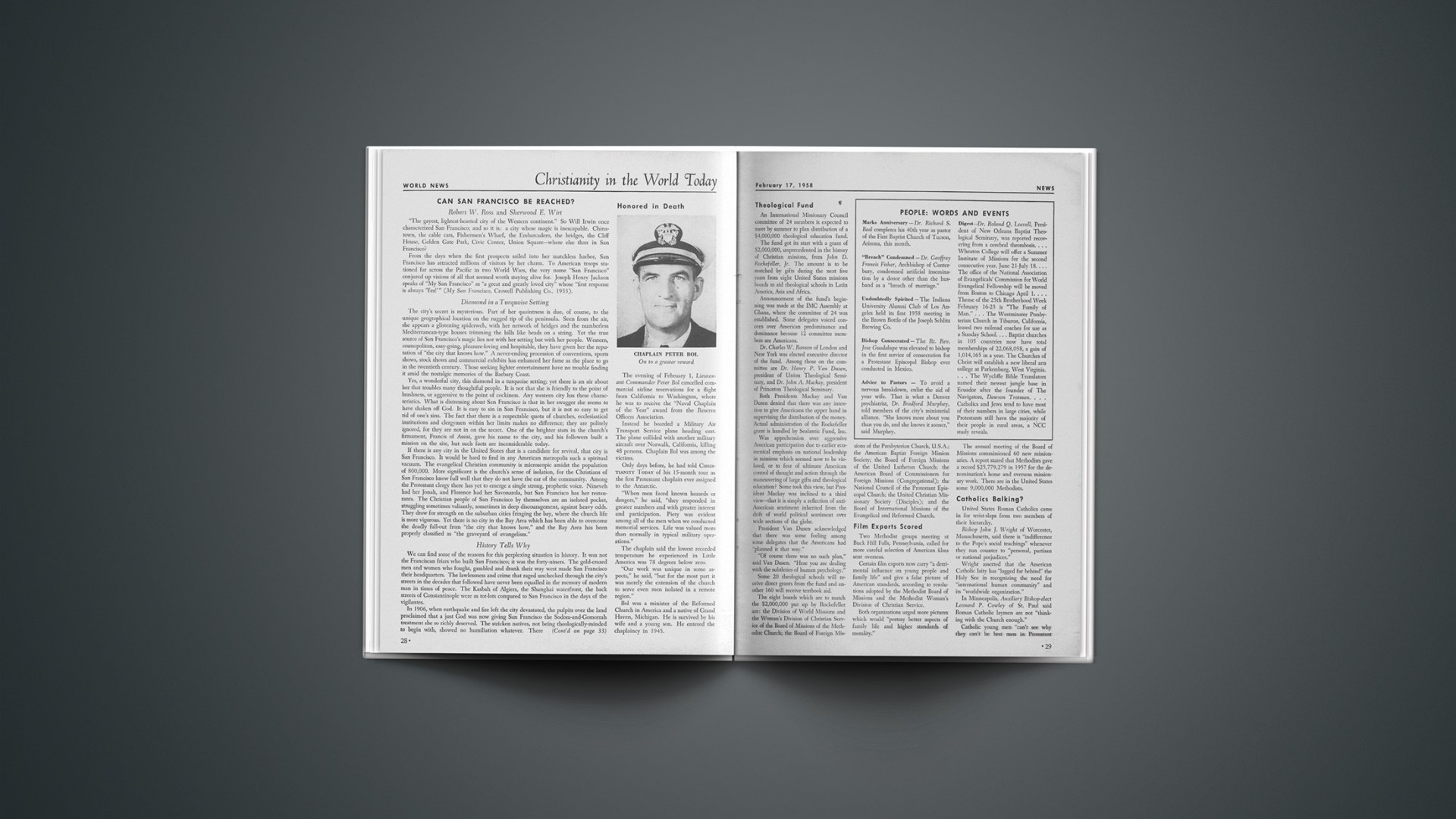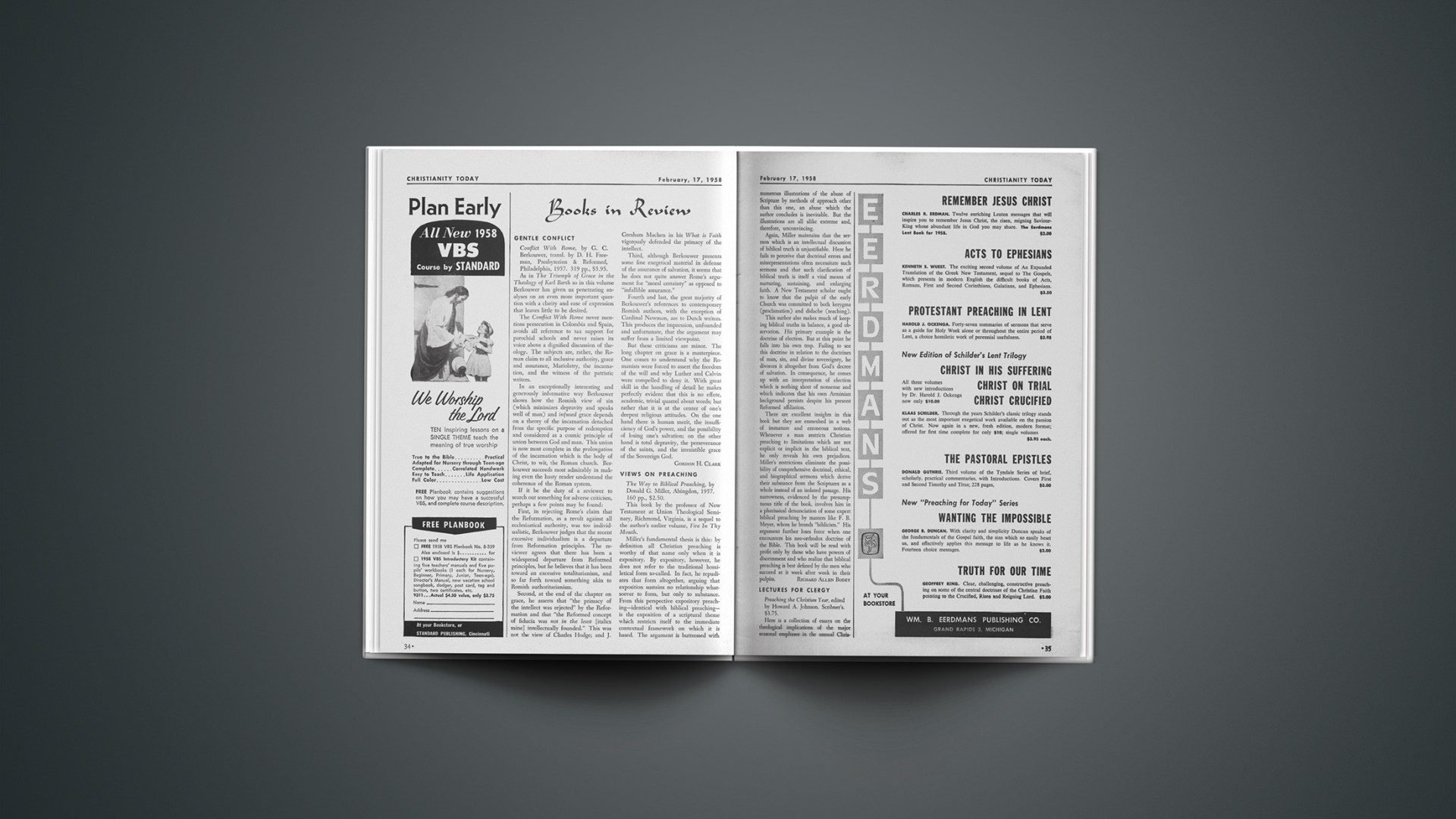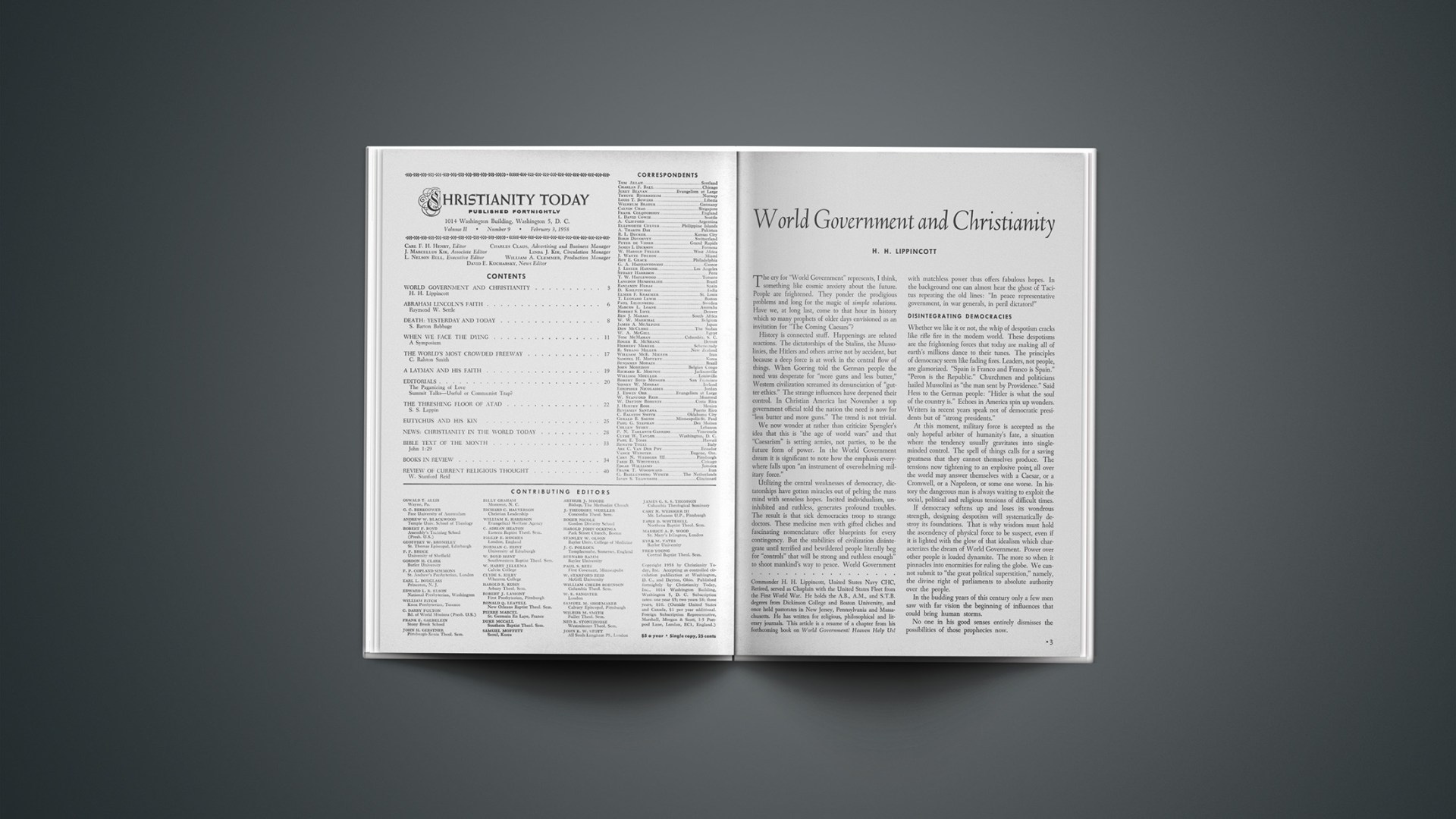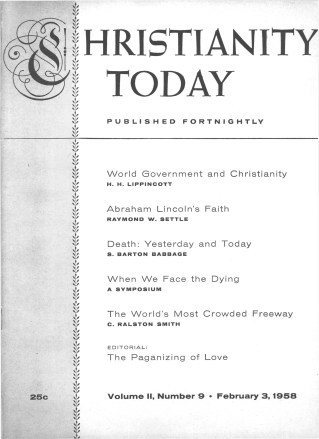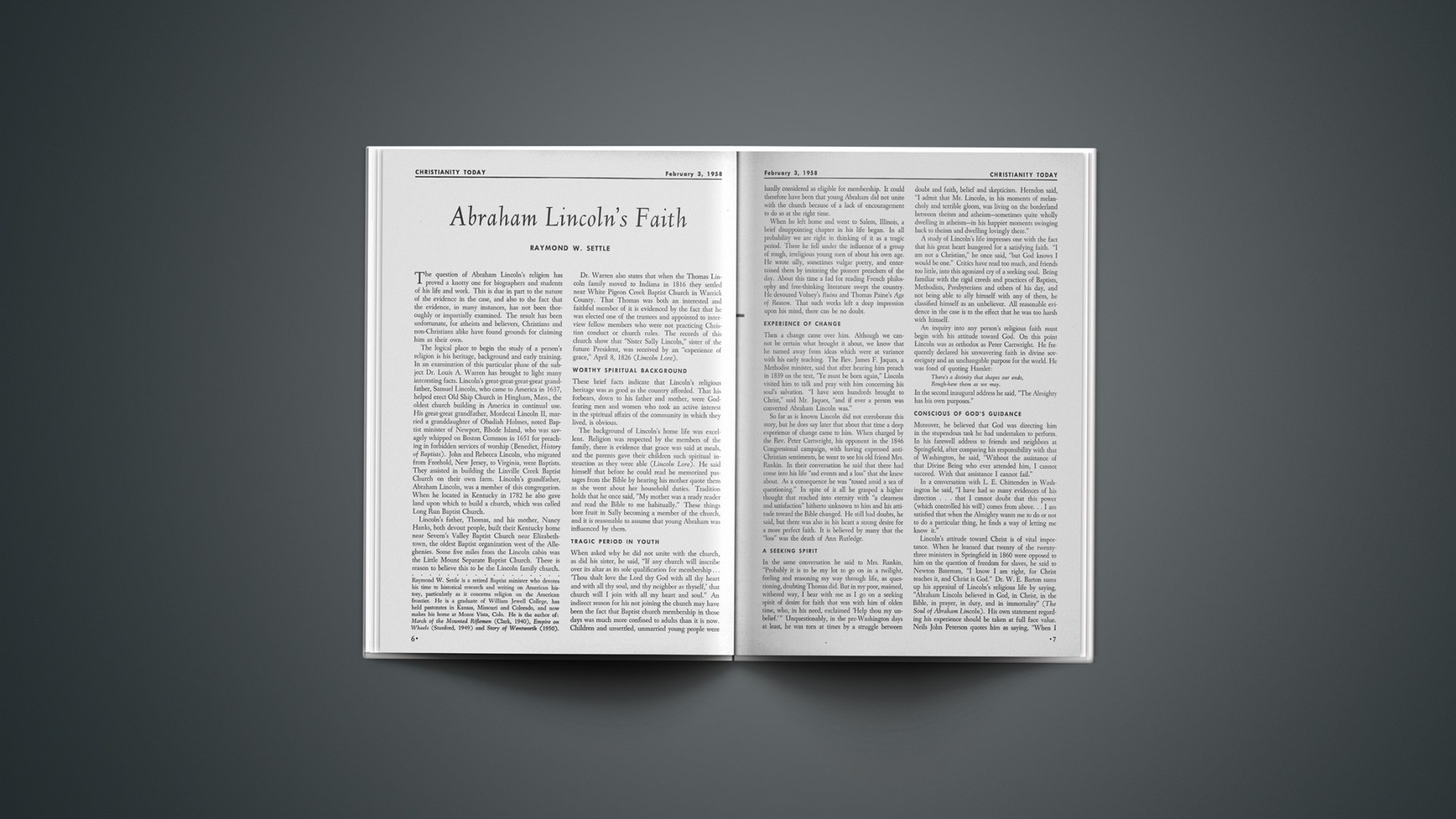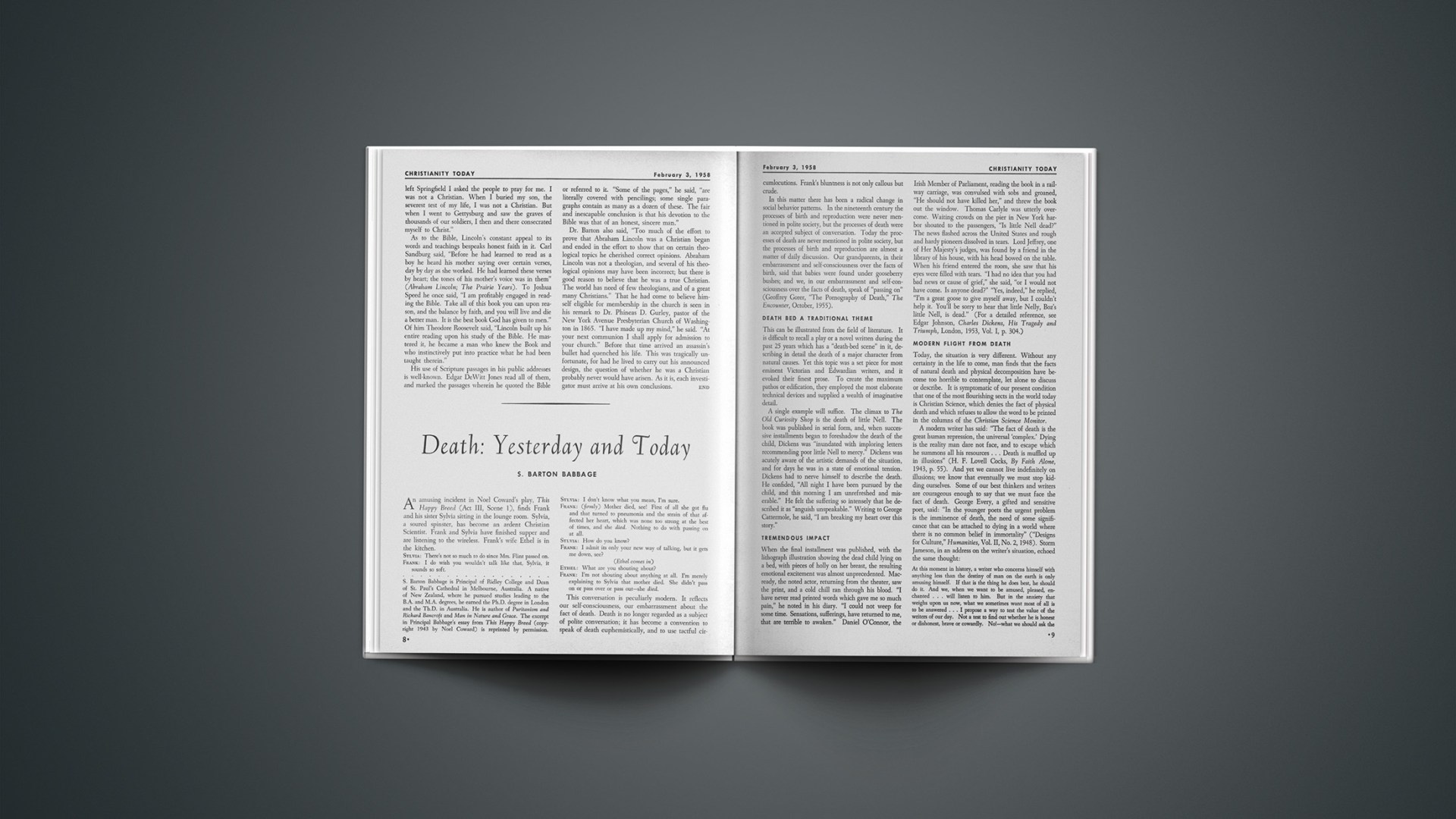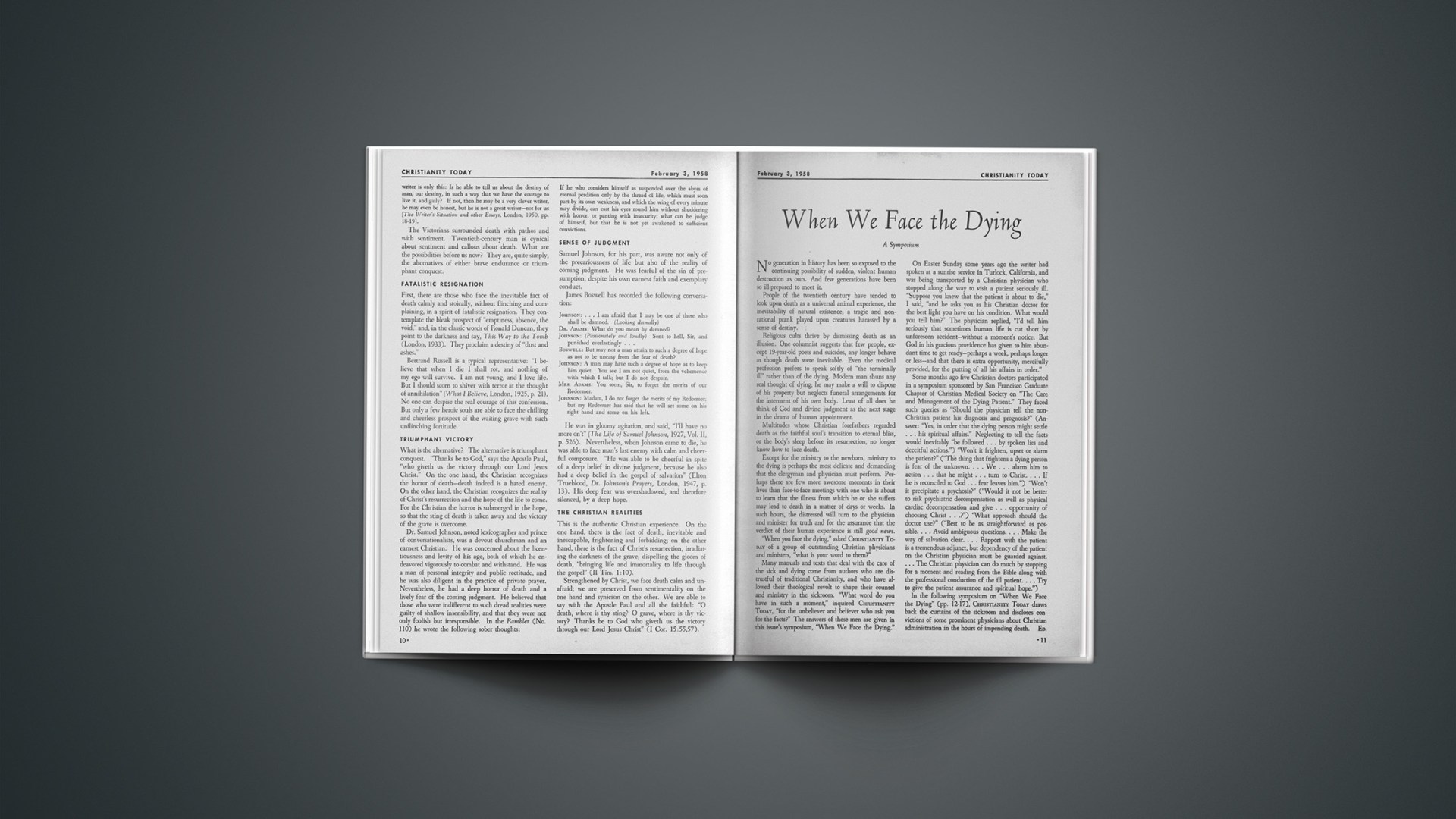One of the most stalwart co-workers of the prophet Isaiah was his eloquent contemporary, Micah of Moresheth-Gath. In that critical juncture of history when Judah stood at the crossroads, faced with the challenge of resurgent idolatry under the patronage of wicked King Ahaz, and menaced by the incursions of Syrians and Samarian Israelites from the north, the very survival of the realm was brought in jeopardy by the Assyrian thundercloud from the east. The Lord God was the only true resource for the beleaguered nation, and it was the task of his faithful messengers, Isaiah and Micah, to call the kingdom to a thoroughgoing repentance, in order that his deliverance might be properly claimed and bestowed upon them in their hour of need.
The town of Moresheth, from which Micah came, was located near Gath in Northern Philistia, about 20 miles west of Jerusalem itself. His father’s name is not mentioned, hence his family must have been obscure and of humble status. His prophecies show an especial awareness of the injustices meted out to the peasant population by the oppressive nobility, who were able to exploit the lower classes with impunity. His range of interest was perhaps more limited than Isaiah’s, for we find in his writings very little reference to international politics, except for one chapter (6) in which he appeals to the rapidly declining northern kingdom of Israel to repent and turn back to God before the final blow of judgment descends upon it. His actual preaching ministry may have covered a much wider scope, for all we know, but the brief summaries of his spoken messages collected in the seven chapters of his written prophecy are all we have to go on.
God’S Sentence Of Doom
1. (1:1–7) Jehovah is at hand to inflict judgment on both idolatrous kingdoms, Israel and Judah. He has spoken his sentence of doom from the very temple in Jerusalem where his holiness has been flouted. He will shake the 12 Tribes as with a devastating earthquake, and will shortly make Samaria into a heap of ruins. The images of the false gods with whom she committed spiritual adultery shall be smashed to pieces. (This was fulfilled in 722 B. C., when the Assyrians stormed and destroyed Samaria after a long and stubborn siege.)
2. (1:8–16) Lamentation over the Impending Desolation. With deep and earnest compassion, the prophet bemourns the devastation which is to overtake his guilty countrymen in the coming invasion of the Assyrian Sennacherib (which took place in 701 B. C.). The invader would advance to the gate of Jerusalem (but no farther, for Sennacherib was never able effectively to lay siege to the capital, even though he overcame all the other walled cities of Judah). Beholding in a prophetic vision the devastation meted out to Gath and Lachish and the other larger cities by the irresistible Assyrians, Micah bewails most dolefully the woes they are going to endure. As he presents these scenes to the mind’s eye of his hearers, he draws a sinister significance from the root meaning of several of the names themselves. For example, Beth-le-aphrah near Jerusalem contains the root for “dust” (‘aphar), in which the anguished mourner must roll himself in his grief. The root of the name Achzib (v. 14) is chazab, “to deceive”; therefore the idol-houses of this city shall prove a baneful deceit and disappointment to those who have trusted in them. Lachish (v. 13), incidentally, is stated in 2 Kings 18:14 to have been the first city of Judah after the death of Solomon ever to receive idol worship into its midst.
The Cause Of Doom
1. Condemnation of the Idle Rich (Chap. 2). The unscrupulous landholders who defraud the poor of their hereditary farms will some day lose all their own landed possessions to the marauding Assyrians and be stripped of their wealth. In their present arrogance they reject all correction from God through his prophets (translate v. 6: “Let those prophesy who will not prophesy of these things, for reproaches—i.e., the reproaches of God’s true prophets—are incessant”). In v. 7 Micah asks God if his spirit is straitened (i.e., is his patience short?), or are these wicked doings from him. God answers that his revealed Word brings benefit to the upright who heed them, but alas! His own covenant people have risen up against him and prey upon their brethren like highway robbers. Heartlessly they foreclose the mortgages of widows and sell poor debtors into slavery, thus besmirching the glory of the God who established Israel as a free nation in the Land of Promise. Ignoring his word they look to the liquor bottle for all their inspiration (2:11). But all the true believers in Israel shall be regathered in the land after the Babylonian Captivity is over, led out of their shattered prison-wall by their Divine King, their Shepherd who will conduct them like a flock of Bozrah sheep to their fold.
2. Condemnation of the Ruling Classes (3:1–4). The governmental officials and magistrates, charged with upholding the law, like bloodthirsty cannibals devour their own countrymen by their heartless exploitation of them. When the evil day of national peril comes upon them, the government will look in vain to God for deliverance.
3. Condemnation of the Corrupt State-Church (3:5–12). Though charged with the responsibility of faithfully preaching God’s Word, the prophets proclaim a false security for the nation, but viciously attack those who will not fatten their pocketbooks. When the evil day comes upon them, they will find themselves without any message from God to declare to the people, but only black despair. But the Bible-believing prophets like Micah himself have an empowerment from God (3:8) to proclaim the truth of Jehovah’s holy wrath upon a nation that ignores him. The terms of this message (3:9–12) are: (a) both government and hierarchy are guilty of perverting justice, perpetrating judicial murder, and staining their hands with bribery and corruption; (b) the clergy falsely proclaim the favor of God while they prostitute their holy office for hire and lead their people into disobedience of Scripture. (c) Therefore God will uphold his moral law by punishing these apostates who suppose he will never allow the holy city to be taken; it will some day be utterly laid waste by hordes of invaders (the Chaldeans under Nebuchadnezzar). From Jeremiah 26:19 we learn that this fiery sermon of Micah produced a powerful impression on Judah and led them to a temporary mood of repentance. It is most significant that even to the present day Mt. Zion (as contrasted with the Temple precinct of Mt. Moriah) has remained neglected and covered with trees and scrub, even as 3:12 predicts.
Ultimate Triumph Of God’S Grace
1. The Victory of the Kingdom of God in the Church-Age and the Millennium (4:1–5). God’s Kingdom will become supreme over all earthly kingdoms, and even the Gentiles shall look to Zion as the place of true revelation and divine authority, yielding to that Messiah who will judge the whole world and teach it the ways of peace. He will usher in a new age in which all shall dwell in peace and secure possession of his own property (in a capitalistic society, therefore). Note that God granted to Isaiah (2:2–4) this same blessed assurance for this same generation.
2. Those who will Share in this Kingdom Blessing (4:6–8): the weak and despised of this world who are faithful to God. God will make them a mighty, conquering force who will win the world with their message and who will as a tower of the Lord’s flock constitute the glorious latter-day Kingdom of God.
3. When this Victory will Come: after the necessary conditions have been fulfilled (4:9–13). For the present there can be no deliverance for the people without a God-fearing government, but only the judgment of exile to Babylon (which is here mentioned by name, a century and a half in advance of the fulfilment). But later God will bring them back to their land in the last days and a converted and believing Israel will gloriously triumph over all heathen foes. Those hostile nations that now (like the Edomites, Ammonites, Moabites and Philistines) maliciously oppose Zion will be wiped out and forgotten (as came to pass in subsequent history).
4. The Victor Himself: a Divine-Human Messiah (5:1–15). The last human king or “judge” of the Davidic dynasty (Zedekiah) will be smitten in the siege of Jerusalem, but the Messianic David will be born in the humble town of Bethlehem (the prediction that directed the Magi to the infant Jesus), even though he will at the same time be the pre-existent God who has ever come forth to reveal himself to the faithful and deliver them. Israel will be given over to Gentile oppression until he comes, born of a travailing woman; then Christ’s brethren (by the adoption of faith) will return (i.e., by repentance join themselves in faith) to the true believers of national Israel—an implied prediction of Gentile converts who are going to be welcomed into the household of faith. As King of the Jews this Messiah will guard his flock and feed them as they spread the glory of Jehovah to the ends of the earth (fulfilling the Great Commission). Chapter 5:5ff. refers in the first instance to the stalwart leaders (of the Maccabaean family) whom the Lord will raise up to deliver Israel from the “Assyrian” of later times (i.e., the Syrian Greeks under Antiochus Epiphanes), and in the second instance to the faithful defenders of the latter days yet to come in the conflict leading up to Armageddon. In the preliminary Church Age, God’s people will be a blessing and refreshment to the nations of earth; but when the final world conflict is ushered in and their mighty David comes on his white horse (Rev. 19:11) at the head of his saints, they shall be a terror to all who rebel against the Lord. But the prophet makes it plain that Israel will never attain this supremacy until she has put away her trust in carnal weapons (horses and chariots, v. 10) and has been completely purged of idolatry. Not until then will the wrath of God be visited upon the disobedient world.
Summons To Repent
1. God Reminds His People of His Loving Care (6:1–5). The mountains and hills that witnessed God’s deliverance of Israel in bygone ages are summoned as witnesses against this thankless generation. They know of the tender love he showed their fathers in redeeming them from Egyptian bondage, frustrating the malice of Balak, King of Moab, and settling them victoriously in the Land of Promise after the plague had been halted at Shittim and the army had been circumcised at Gigal.
2. Acceptable Repentance is Marked by a Sincere and Living Faith (6:6–8). Here the repentant minority of Judah asks how they may best demonstrate their sorrow for ingratitude and sin. Will lavish material sacrifices and offerings please God? No, not by themselves, not even if one were to sacrifice his firstborn child upon the altar, as the brutal idolators do who try to appease their imaginary gods. Only a true and living faith that manifests itself in holy living can possibly please God. Note that this answer is given to those who have already entered into the covenant of grace, to those who have already made a profession of faith in the Lord. The issue at stake is a true faith versus a sham profession; in context v. 8 cannot be interpreted to describe a possible way of salvation by good works (as many have mistakenly supposed).
3. Self-Condemnation as the Necessary Prerequisite to Forgiveness and Blessing (6:9–13). As the chastening rod of the Assyrian power approaches Judah, the nation is bidden to examine their conscience and see what dishonesty in business, what oppression of the poor, what deceitfulness of tongue has defiled their soul. Inevitably they have been chastened because of their sins.
4. The Dread Consequences of Withholding Repentance (6:14–16). All your crops will be devoured by invaders and all your savings will be swept away, because you have chosen the idolatrous worship which Omri promoted in Samaria, and which his evil granddaughter, Queen Athaliah, sponsored in Judah as well (true to the example of her idolatrous mother, Jezebel of Tyre). The final result will be complete desolation and destruction.
God Will Fulfil His Promises
1. Attitude of True Believers during this Apostate Age (7:1–10). (a) Towards their misguided countrymen they will feel sorrowful compassion. The old-fashioned standards of decency and honor have under the impact of the new “broad-mindedness” in religion given way to an inevitable breakdown in morals. The ruling classes sell justice for bribes and have become devoid of integrity; all the modern generation are untrustworthy and treacherous, and the children despise and dishonor their parents. (Observe how this state of affairs is to recur in the Last Days, according to Christ’s prediction in Matthew 10:35.) (b) Towards God himself they will continue in confident trust, despite all hardship and persecution (7:7–10). The worldling will fall to permanent defeat, but the trusting believer is cast down only to rise the higher, using his tribulations as steppingstones to glory. All he endures he accepts with humility as due to such a sinner as he, and he waits confidently for the moment of vindication. God will demonstrate his covenant-righteousness by delivering him in the end, and bringing to well-deserved ruin those who have hated God’s people and ridiculed their faith in him.
3. The Final Triumph of Christ: Christians Supreme over all the Earth (7:11–17). The spiritual walls of Jerusalem will be built by the sincere faith and obedience of believers; when these are erected, then the decree of chastisement and exile will be revoked. “In that day,” i.e., in the day of Jehovah, converts shall come to him from the East and West (Assyria and Egypt), after Palestine has first passed through the desolation decreed because of Israel’s sin. At v. 14 Micah addresses directly to God a prayer to shepherd his people with the rod of chastisement and protection, restoring them from exile. God replies that he will manifest his miracle-working power as in the days of the Exodus, and bring to humiliation and confusion all the heathen, compelling them to fear and reverence his chosen people.
4. The Glory of the Lord Exhibited by these Dealings with His Covenant People (7:18–20). “Who is a God like unto Thee?” reflects the literal meaning of Micah’s own name: “Who is like Jehovah?” The prophet marvels at his wondrous grace and compassionate forgiveness, utterly wiping out the score of sin, and fulfilling the promise made to Abraham and his seed so many centuries before.
Thus Micah covers in the relatively short summary of his prophecies that has survived to us most of the salient features of God’s age-long plan for his covenant people. Cardinal facts concerning the first and second advents of our Lord and the end of the age are packed into these few eloquent pages, and they are worthy of earnest and frequent study. One should have recourse to scholarly commentaries.
Probably the most satisfactory commentary of all is that by C. F. Keil in the Keil and Delitzsch series: Minor Prophets, vol. 1 (Eerdmans). Another excellent treatment is that by Paul Kleinert in the Lange Commentary series: Minor Prophets (Zondervan). This last has the merit of dividing up the treatment of each passage into (a) textual critical matters, for students of Hebrew; (b) exegetical interpretation of a detailed nature; (c) doctrinal and ethical discussion; and (d) homiletical hints. Yet the discussion of the obscure points of interpretation is not apt to be so thorough and satisfying as in Keil’s work. An old stand-by dating from the middle of the last century is E. B. Pusey’s The Minor Prophets, vol. 2 (Baker). From a theologically liberal standpoint, the scholarly work of W. R. Harper in the International Critical Commentary series is worthy of mention, although characterized by the divisive criticism characteristic of his school of thought. A stimulating interpretation in popular style is that by H. A. Ironside: Notes on the Minor Prophets (Loizeaux). This, of course, is colored by a consistent dispensational standpoint, and does not always take the contemporary political scene into proper consideration. For a thorough and helpful treatment written in a simple, popular style, nothing can excel B. A. Copass and E. L. Carlson, A Study of the Prophet Micah (Baker, 1950). This goes thoroughly into matters of historical background and orientates the student into the milieu in which Micah found himself when God sent him forth to preach his matchless Word.
GLEASON L. ARCHER, JR.

